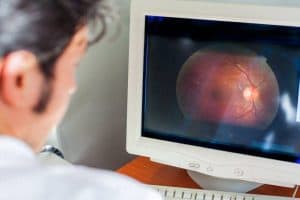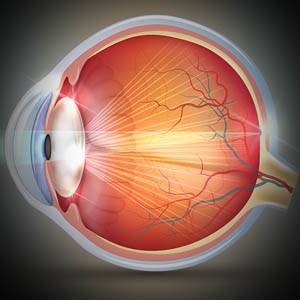Macular degeneration is the leading cause of vision loss and total blindness in the western world.
The right supplements may help protect your eyes.
Macular degeneration can be a devastating condition, resulting in permanent blindness.
Unfortunately, a cure has yet to be found, and treatments focus largely on preventing further damage to the macula and retina, and preserving remaining vision.
One leading recommendation from eye doctors, based on evidence provided in Acta Ophthalmologica (Jan 2015) is to begin taking supplements that may reduce your risks of developing this condition or slow its progression.
So, what is macular degeneration, and which supplements are best if you have been diagnosed with the sight-threatening eye condition?
What is macular degeneration?
Macular degeneration is the #1 cause of vision loss in the western world.
Over 11% of the US population and nearly 200 million people around the world have macular degeneration (AMD).
AMD is eye disease that affects the retina, the light-sensitive layer of tissue at the back of the eye responsible for sending visual information to the brain.
As its name implies, macular degeneration targets the area of the retina known as the macula, which is located in the center of the retina and is responsible for our sharp and detailed central vision.
If not detected and treated early, AMD can cause extensive vision loss and even total blindness.
Macular degeneration is categorized into two types:
Also known as atrophic macular degeneration, this type accounts for as many as 90% of cases.
In this prevalent form of the disease, the macula begins to thin or may break down completely. In most cases, this happens as a result of the build-up of tiny yellow deposits called drusen, under the retina.
If untreated, this build-up of drusen can damage the macula, leaving a blurry or blind spot in the center of a person’s vision.
Also known as neovascular macular degeneration, this type occurs when new fragile blood vessels develop under the macula, causing blood and other fluids to leak into the retina.
As these fluids build-up, the macula begins to swell, which can result in vision loss, eventually advancing to retinal scarring and complete blindness.
Wet macular degeneration is the more serious form of the two, and can advance rapidly into a sight-threatening condition.
SEE RELATED: What is Macular Degeneration?
For more information on how supplements can help fortify your eyes against macular degeneration, contact your local eye doctor.
Supplements that combat macular degeneration
The National Eye Institute’s Age-Related Eye Disease Study (AREDS and AREDS 2) found that certain supplements are effective in combating the progression of dry macular degeneration.
This highly regarded research also showed that specific supplements help to prevent dry macular degeneration from transitioning to the wet form, and help prevent vision loss in the second eye after the first has already lost sight due to macular degeneration.
The original AREDS study suggested taking these supplements: Beta carotene, Vitamin E, Copper, Vitamin C and Zinc.
The second study, AREDS 2, suggested that, with a few changes to the supplement regimen, even better results could be obtained.
These supplements were combined into a specific formulation, which can be found under the name AREDS/AREDS 2 Formulation.
The AREDS 2 Formulation contains:
Zeaxanthin and Lutein
These belong to a family of nutrients known as carotenoids, which can be found in high concentrations in leafy green vegetables.
These can also be found in low concentrations in some animal-based foods. These nutrients are naturally occurring in the eye, and serve to protect the eye from oxidants and the damaging effects of ultraviolet and blue light.
Zinc and Copper
Zinc is found in foods such as eggs, milk, spinach, mushrooms and yogurt.
Zinc plays a vital part in bringing vitamin A up from the liver to the retina to produce a pigment in the eye known as melanin, which protects your eyes from sun damage. Copper is added into the AREDS 2 formulation to offset the potential of excess zinc in the body, which can cause copper deficiency anemia.
Vitamin E
This vitamin is found in high concentrations in foods such as peanuts, hazelnuts and sweet potatoes.
Vitamin E is believed to play an important role in reducing the presence of unstable molecules known as free radicals. These cause damage to the sensitive tissues of the eye, contributing to the development of macular degeneration.
Vitamin C
This vitamin can be found in citrus fruits such as oranges and grapefruit, as well as vegetables such as broccoli and kale.
Like vitamin E, it helps reduce the presence of free radicals that contribute to macular degeneration. It also plays a role in the formation of collagen, a protein that gives structure to the eye.
Further findings of this study were that omega-3 fatty acids, while good for overall vision health, did not affect the development or progression of macular degeneration either positively or negatively.
Along with this research, an April 2019 study published in Antioxidants suggests that vitamin A, selenium and anthocyanins are also beneficial in promoting macular health and treating macular degeneration.
A word of caution on supplements
You should always consult with medical professionals before making major changes to your diet, including starting to take supplements.
Overconsumption of some vitamins can cause toxicity, and certain health conditions may be negatively affected by certain vitamins, minerals and antioxidants.
Excess levels of vitamin A can result in blurred vision, dry skin and headaches.
Vitamin E toxicity can cause poor absorption of nutrients, increased bleeding and problems with your gallbladder and liver.
LEARN MORE: Guide to Eye Conditions
If you have been diagnosed with macular degeneration, schedule an appointment with an eye doctor to receive the latest medical care and nutritional advice.
Supplements can be a positive and beneficial addition to your diet, and help preserve your vision against worsening macular degeneration and other vision-threatening eye conditions.








